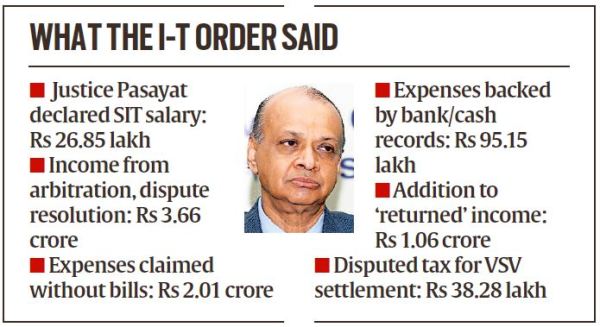FORMER Supreme Court judge, Justice Arijit Pasayat, Deputy Chairman of the two-member Special Investigation Team (SIT) on black money, is one of those who availed of the Government’s amnesty scheme after Income Tax authorities flagged alleged misreporting of income by him, The Indian Express has learnt.
Justice Pasayat was appointed to the SIT in May 2014 — marking the first Cabinet decision of the Narendra Modi government — which is chaired by retired Justice M B Shah.

🚨 Limited Time Offer | Express Premium with ad-lite for just Rs 2/ day 👉🏽 Click here to subscribe 🚨
Eight years on, the SIT on black money has submitted several status reports to the Supreme Court, which monitors its progress.
It was in November 2020, a year after he received an order from the Cuttack unit of the Income Tax Department for allegedly misreporting his income for 2017-18 to the extent of Rs 1.06 crore, that Justice Pasayat availed of the Government’s amnesty scheme.
The scheme, mounted after introduction of the Direct Tax Vivad Se Vishwas Act 2020, was extended to 2021 and is simply called the VSV Scheme. Its short title describes it as a scheme for “resolution of disputed tax” and its Section 6 elaborates that those who avail of it get immunity from proceedings in respect of the “offence.”
Justice Pasayat, Government officials said, paid Rs 37.90 lakh under the VSV Scheme for “disputed” tax amounting to Rs 38.28 lakh.

Story continues below this ad
Under provisions of the scheme, Justice Pasayat’s “disputed” tax was calculated as per this formula: 30% of the additional tax added to income (Rs 31.94 lakh); 15% additional surcharge (Rs 4.79 lakh) and 3% education and higher education cess (Rs 1.10 lakh) and interest under Section 234 (Rs 43,616.)
When asked about this by The Indian Express, Justice Pasayat confirmed that he availed of the VSV Scheme in November 2020 and paid Rs 37.90 lakh.
He added: “I do not know how a private 2019 income tax order has been leaked…it could be by someone who was hurt by an order I passed. I had filed an appeal against the order but I was then advised to avail of the VSV Scheme, pay tax and end the matter. Why should a settled matter be raked up now?’’
A scrutiny of the 21-page order against Justice Pasayat, passed by the Deputy Commissioner of Income Tax, Cuttack on December 31, 2019 shows that the addition of Rs 1,06,49,760 was made to the “returned” income of the retired Supreme Court Judge and Vice Chairman of the Black Money SIT for “excess claim of expenses from Arbitration and Dispute Resolution work.”
Story continues below this ad
The detailed order shows that, for the assessment year 2017-18, Justice Pasayat had declared his income from salary (from the Government for his position on the SIT) of Rs 26.85 lakh and Rs 3.66 crore as income from arbitration and dispute resolution work. But, the order notes, he had declared this amount under the head “income from other sources” and not as “professional income.”
The other objections raised by the Income Tax Department, in its order, were that a scrutiny of the former judge’s bank accounts and the fund-flow prepared by I-T show a mismatch towards claimed “expenses” of Rs 2.01 crore shown by him for his arbitration and dispute resolution work and that no bills and vouchers were maintained for expenses claimed. Also, that Justice Pasayat’s bank accounts revealed payments to the tune of Rs 1.34 crore as loan/gifts to his daughter, described in the order as a lawyer and CBI Public Prosecutor.
As a final assessment, the IT order states: “A substantive reason for disallowance of the said expenditure is that such claim of expenditure is not substantiated by any evidence, nor is there any bank/cash withdrawal to support the expenditure. Therefore, the said amount of Rs 1,06,49,760 is not found eligible for deductions u/s 57 (iii) of the IT Act. Accordingly, the same is added back to the returned income of the assesse.”
Significantly, besides adding this “returned” income, the Department initiated — “separately” — penalty proceedings (under Section 270A(1) of the IT Act) misreporting of income of Rs 1,06,49,760.
Story continues below this ad
As Justice Pasayat has admitted, he filed an appeal against the order with the Commissioner of Income Tax (appeals) in Cuttack but once having decided to avail of the VSV Scheme, that appeal was put in abeyance.
What the I-T order said
* Justice Pasayat declared SIT salary: Rs 26.85 lakh
* Income from arbitration, dispute resolution: Rs 3.66 crore
* Expenses claimed without bills: Rs 2.01 crore
* Expenses backed by bank/cash records: Rs 95.15 lakh
* Addition to ‘returned’ income: Rs 1.06 crore
* Disputed tax for VSV settlement: Rs 38.28 lakh



































